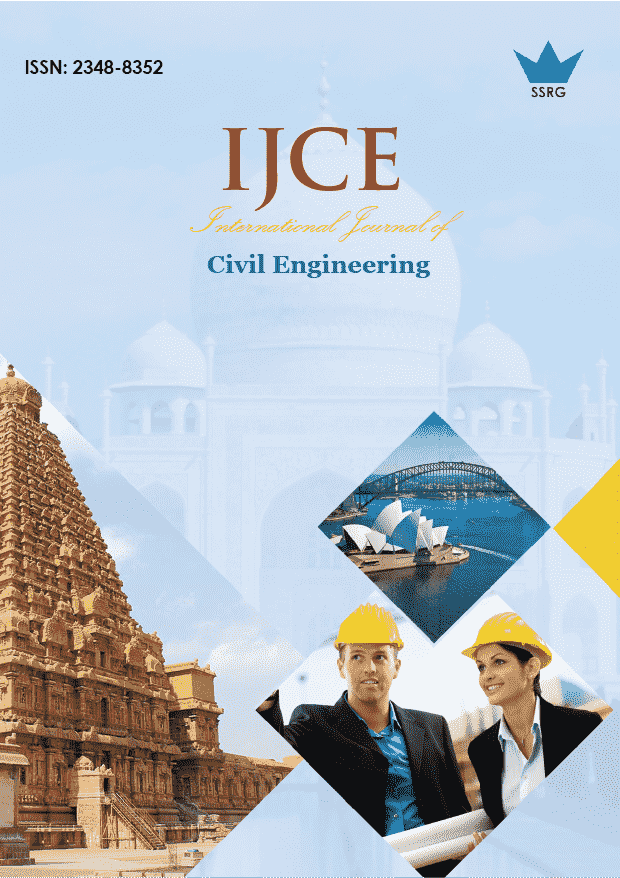Factors Affecting the Consideration of Public-Private Partnerships (PPPs) for Smart City Projects in Indore City

| International Journal of Civil Engineering |
| © 2024 by SSRG - IJCE Journal |
| Volume 11 Issue 5 |
| Year of Publication : 2024 |
| Authors : Pranav Lende, Swati Ambadkar |
How to Cite?
Pranav Lende, Swati Ambadkar, "Factors Affecting the Consideration of Public-Private Partnerships (PPPs) for Smart City Projects in Indore City," SSRG International Journal of Civil Engineering, vol. 11, no. 5, pp. 138-147, 2024. Crossref, https://doi.org/10.14445/23488352/IJCE-V11I5P114
Abstract:
This paper provides an in-depth analysis of Public-Private Partnerships (PPPs) in the context of urban development in Indore city, with a focus on initiatives undertaken under the Smart City scheme. It explores the conceptual framework of PPPs, elucidating governance structures, risk allocation mechanisms, and contractual arrangements crucial for effective collaboration between the public and private sectors. The rationale for PPPs in Indore's smart city initiatives, encompassing access to resources, risk mitigation, innovation, efficiency, and public accountability, underscores their significance in urban development. The paper examines the existing PPP projects implemented under the Smart City scheme in Indore, highlighting key achievements, challenges encountered, and lessons learned. It also discusses proposed PPP projects and future recommendations for enhancing urban infrastructure, service delivery, and quality of life for residents. The analysis encompasses diverse PPP models and structures, including Build-Operate-Transfer (BOT), Design-Build-Operate (DBO), Concession Agreements, and Service Contracts tailored to the specific needs and characteristics of Indore's smart city projects. Furthermore, the paper addresses indexing, providing a comprehensive overview of the literature on PPPs in Indore City and related urban development initiatives. By synthesizing existing knowledge and offering insights into future research directions, this paper contributes to the understanding of PPPs in urban development. It provides practical recommendations for policymakers, urban planners, and stakeholders involved in Indore's smart city transformation.
Keywords:
Smart city Indore, Public-Private Partnerships (PPP), Smart cities mission, Urban development.
References:
[1] Government of India, Smart Cities Mission, 2015. [Online]. Available: https://smartcities.gov.in/content/
[2] Smart cities and Academia towards Action and Research (SAAR). Part C: Urban Infrastructure, National Institute of Urban Affairs, SAAR, 2023. [Online]. Available: https://smartcities.gov.in/sites/default/files/2023-06/PartC-UI.pdf
[3] Indore Development Plant 2021. [Online]. Available: https://mptownplan.gov.in/LUpanel/Indore/Indore%20development%20plan%202021.pdf.
[4] Junxiao Liu et al., “Conceptual Framework for the Performance Measurement of Public-Private Partnerships,” Journal of Infrastructure Systems, vol. 21, no. 1, pp. 918-931, 2015.
[CrossRef] [Google Scholar] [Publisher Link]
[5] Maria-Lluïsa Marsal-Llacuna, Joan Colomer-Llinàs, and Joaquim Meléndez-Frigola, “Lessons in Urban Monitoring Taken from Sustainable and Livable Cities to Better Address the Smart Cities Initiative,” Technological Forecasting and Social Change, vol. 90, pp. 611-622, 2015.
[CrossRef] [Google Scholar] [Publisher Link]
[6] Amos Darko et al., “Influences of Barriers, Drivers, and Promotion Strategies on Green Building Technologies Adoption in Developing Countries: The Ghanaian Case,” Journal of Cleaner Production, vol. 200, pp. 687-703, 2018.
[CrossRef] [Google Scholar] [Publisher Link]
[7] John Rice, and Nigel Martin, “Smart Infrastructure Technologies: Crowdsourcing Future Development and Benefits for Australian Communities,” Technological Forecasting and Social Change, vol. 153, 2020.
[CrossRef] [Google Scholar] [Publisher Link]
[8] Ahmed M. Selim, and Amr Soliman ElGohary, “Public-Private Partnerships (PPPs) in Smart Infrastructure Projects: The Role of Stakeholders,” HBRC Journal, vol. 16, no. 1, pp. 317-333, 2020.
[CrossRef] [Google Scholar] [Publisher Link]
[9] Patrick T.I. Lam, and Wenjing Yang, “Factors Influencing the Consideration of Public-Private Partnerships (PPP) for Smart City Projects: Evidence from Hong Kong,” Cities, vol. 99, 2020.
[CrossRef] [Google Scholar] [Publisher Link]
[10] T.S. Ramakrishnan, “Financing Infrastructure Projects through Public–Private Partnerships in India,” Transportation Research Record: Journal of the Transportation Research Board, vol. 2450, no. 1, pp. 118-126, 2014.
[CrossRef] [Google Scholar] [Publisher Link]
[11] United Nations, World Urbanization Prospects: The 2018 Revision, Department of Economic and Social Affairs, Population Division. 2018. [Online]. Available: https://population.un.org/wup/
[12] UN ESCAP, Public-Private Partnerships in Infrastructure Development: Developing Sustainable Models, United Nations. 2018. [Online]. Available: https://www.unescap.org/sites/default/files/PPPs%20in%20Infrastructure%20Development%20report.pdf
[13] World Bank, Public-Private Partnerships Reference Guide Version 2.0, World Bank Group, 2017. [Online]. Available: https://ppp.worldbank.org/public-private-partnership/library/publications/ppp-reference-guide-version-2.0
[14] Xiangyu Quan, and Marte C.W. Solheim. “Public-Private Partnerships in Smart Cities: A Critical Survey and Research Agenda,” City, Culture and Society, vol. 32, pp. 1-8, 2023.
[CrossRef] [Google Scholar] [Publisher Link]
[15] Nimesha Sahani Jayasena, Daniel W.M. Chan, and Mohan M. Kumaraswamy, “Is Public-Private Partnership (PPP) a Preferred Strategy for Procuring Smart Infrastructure in Developed Countries: An Empirical Study of the Perceived Benefits, Barriers and Recommended Strategies,” Sustainability, vol. 14, no. 11, pp. 1-25, 2022.
[CrossRef] [Google Scholar] [Publisher Link]
[16] Georgios Siokas, Valia Kelaidi, and Aggelos Tsakanikas, “The Smart City as a Hub for Nourishing Public-Private Partnerships,” Sustainable Cities and Society, vol. 76, 2022.
[CrossRef] [Google Scholar] [Publisher Link]
[17] J.Q. Yang, and J.L. You, “Research on the Application of PPP Model in Smart City Projects,” IOP Conference Series: Earth and Environmental Science, vol. 330, no. 5, pp. 1-8, 2019.
[CrossRef] [Google Scholar] [Publisher Link]
[18] Daniela Pianezzi, Yuji Mori, and Shahzad Uddin, “Public–Private Partnership in a Smart City: A Curious Case in Japan,” International Review of Administrative Sciences, vol. 89, no. 3, pp. 632-647, 2021.
[CrossRef] [Google Scholar] [Publisher Link]
[19] Astrid Voorwinden, “The Privatised City: Technology and Public-Private Partnerships in the Smart City,” Law, Innovation and Technology, vol. 13, no. 2, pp. 439-463, 2021.
[CrossRef] [Google Scholar] [Publisher Link]

 10.14445/23488352/IJCE-V11I5P114
10.14445/23488352/IJCE-V11I5P114